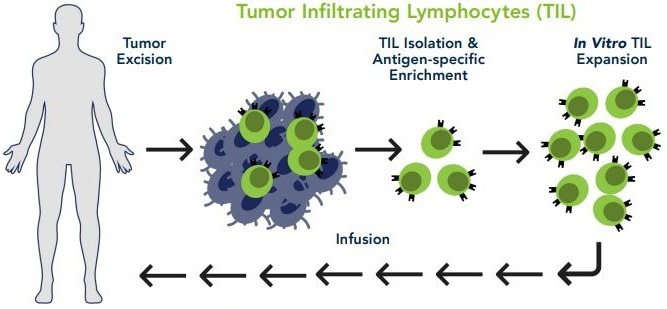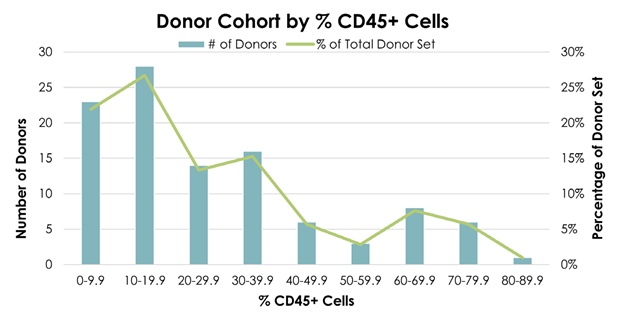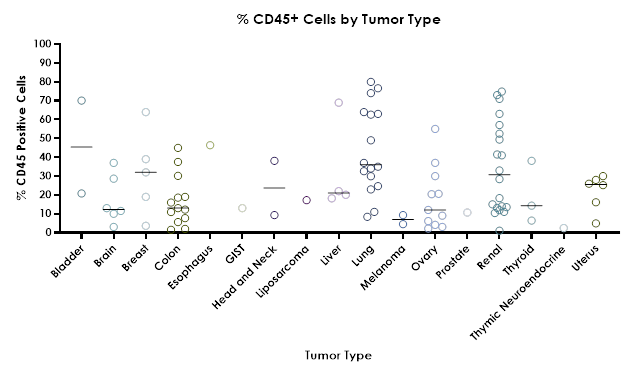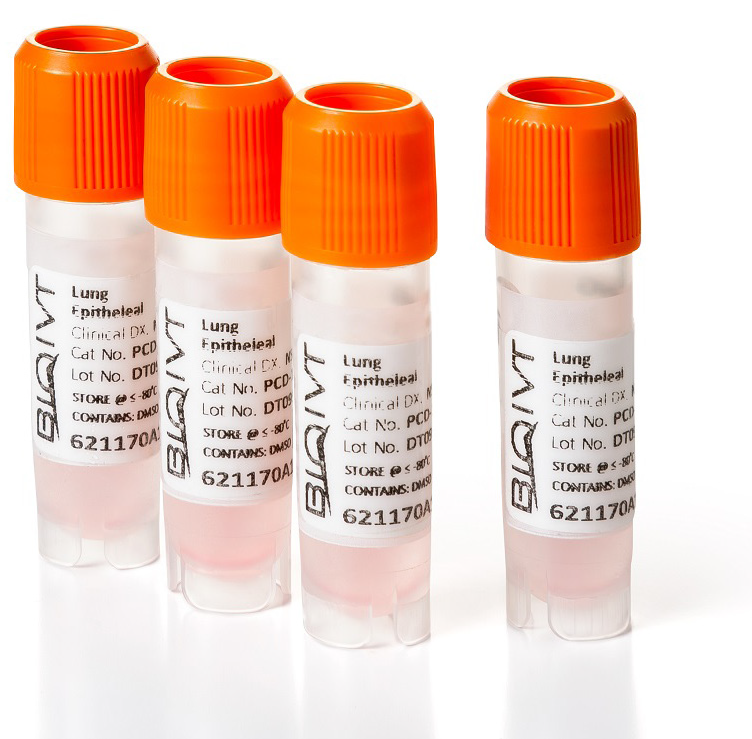Dissociated Tumor Cells (DTCs) are single-cell suspensions dissociated from a solid tumor through the use of digestive enzymes and mechanical separation.
This has the benefit of cryopreserving the cells for on-demand research, in contrast to the scheduling and regulatory constraints associated with the collection and shipment of fresh tissue.
DTCs are heterogeneous cell populations that contain a mixture of fibroblast and epithelial cells. They also contain lymphoid cell subsets like B cells, T cells, and natural killer (NK) cells, which can be easily isolated via standard immunomagnetic selection.
DTCs are therefore a valuable source of tumor-infiltrating lymphocytes (TILs), which are significantly important for cellular therapies targeting solid tumors.
TILs and the tumor microenvironment (TME)
Solid tumors are an elusive target for researchers, as each TME contains numerous immune-evading signals that diminish the anti-tumor response.
For example, cancer-associated fibroblasts (CAFs) within a tumor may upregulate their fibroblast-activation protein (FAP) expression, leading to increased tumor growth and less accumulation of intra-tumoral T cells.1
Oncogene-driven expression of cytokines promotes an immunosuppressive environment. This also deprives the TME of tumor-fighting signals.2
As a result, lymphocytes that proliferate within the tumor exhibit a substantial advantage over peripheral lymphocytes, increasing overall survival rates in cancer patients with high levels of CD3+, CD4+, and CD8+ TILs.3
Current TIL treatment involves ex vivo expansion of TILs from the excised tumor material with an adoptive transfer into the patient following a lymphodepleting preparative procedure and subsequent support of interleukin-2 (IL-2).4
Initial successes in melanoma patients have driven significant expansion of the field to encompass various other solid tumor types.

Image Credit: BioIVT, LLC
Characterization of TILs from DTCs
BioIVT’s DTC products, isolated from various tumors, were examined for TIL populations.
From a cohort of 95 solid tumor donors, a high degree of donor-to-donor variability in TIL concentration exists. On average, solid tumors contain 27.8 % CD45+ cells (21.5 % standard deviation), with a range spanning from 1.0 % to 80.0 %.

Image Credit: BioIVT, LLC
The highest CD45+ populations exist in bladder, renal, and lung tumors (45.4 %, 34.6 %, and 44.0 % respectively). However, a high level of donor-dependent variability remains in these tissue types.
DTC viability and cell yield are influenced by the quality of the tissue supplier’s operating processes throughout the production phase.
The acquisition of high-quality DTCs necessitates the optimization of all aspects of the upstream process, including tissue resection time (warm ischemic time) and histopathological assessment, shipping, and disaggregation times (cold ischemic time).
BioIVT has dedicated almost three decades to refining its expertise in tissue collection to ensure optimal product quality.

Image Credit: BioIVT, LLC
Various techniques for the ex vivo expansion of TILs exist. They typically involve triggering the T cell receptor (TCR) complex by T cell-stimulating growth factors or feeder cells.
The duration of TIL expansion has also been shown to give rise to new T cell clones that are only just detected in the originating tumor. This is probably due to differences in in vivo and in vitro environments.5

Image Credit: BioIVT, LLC
Breakthrough methodologies in single-cell analysis facilitated the identification of T-cell clones that maximally react to autologous tumors.
BioIVT uses collection methods that enable researchers to acquire DTCs and PBMCs in a matched set, enabling a better comparison of the epigenetic differences between peripheral lymphocytes and TILs from the same donor.
While TIL cell therapies are still in the early clinical phases of development, BioIVT’s technical team is on the cutting edge of this field, providing the best support for your research.
References and further reading
- Fearon, D. T. (2017). Immune-Suppressing Cellular Elements of the Tumor Microenvironment. Annual Review of Cancer Biology, 1(1), 241–255.
- Binnewies, M., et al. (2018). Understanding the Tumor Immune Microenvironment (TIME) for Effective Therapy. Nature medicine, 24(5), 541–550.
- Labani-Motlagh, A., Ashja-Mahdavi, M., & Loskog, A. (2020). The Tumor Microenvironment: A Milieu Hindering and Obstructing Antitumor Immune Responses. Frontiers in Immunology, 11.
- Rohaan, M. W., Wilgenhof, S., & Haanen, J. (2019). Adoptive cellular therapies: the current landscape. Virchows Archiv : an international journal of pathology, 474(4), 449–461.
- Poschke, I. C., et al. (2020). The Outcome of Ex Vivo TIL Expansion Is Highly Influenced by Spatial Heterogeneity of the Tumor T-Cell Repertoire and Differences in Intrinsic In Vitro Growth Capacity between T-Cell Clones. Clinical Cancer Research, 26(16), 4289–4301.
About BioIVT
BioIVT, formerly BioreclamationIVT, is a leading global provider of high-quality biological specimens and value-added services. We specialize in control and disease state samples including human and animal tissues, cell products, blood, and other biofluids. Our unmatched portfolio of clinical specimens directly supports precision medicine research and the effort to improve patient outcomes by coupling comprehensive clinical data with donor samples.
Our Research Services team works collaboratively with clients to provide in vitro hepatic modeling solutions. And as the world’s premier supplier of ADME-Tox model systems, including hepatocytes and subcellular fractions, BioIVT enables scientists to better understand the pharmacokinetics and drug metabolism of newly discovered compounds and the effects on disease processes. By combining our technical expertise, exceptional customer service, and unparalleled access to biological specimens, BioIVT serves the research community as a trusted partner in ELEVATING SCIENCE®.
Sponsored Content Policy: News-Medical.net publishes articles and related content that may be derived from sources where we have existing commercial relationships, provided such content adds value to the core editorial ethos of News-Medical.Net which is to educate and inform site visitors interested in medical research, science, medical devices and treatments.